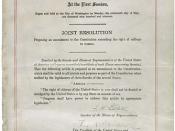We, the people of these United States of America, have the protection afforded to us by the United States Constitution. The Constitution gives these rights to every person who is a citizen of the country no matter race, gender or creed. The framers of the Constitution set this forward just so that we would not be controlled as they were so many years ago. The Fourth amendment, part of the Bill of Rights of the US Constitution, says; "The right of the people to be secure in their persons, house, papers, and effects, against unreasonable searches and seizures, shall not be violated, and no warrants shall issue, but upon probable cause, supported by oath or affirmation, and particularly describing the place to be searched, and the persons or things to be seized." This gives us the protection against unlawful search and seizures performed by law enforcement. But with everything in this government there are exceptions.
There are no provisions in the Fourth Amendment that specifically authorize a search without a warrant. However, the courts have long recognized exceptions and have, on basis of necessity, approved searches without a warrant. Although the exceptions have been modified in recent years, the instances in which searches can be made without a warrant can be defined, enumerated and explained. If warrantless search does not come within one of the specific exceptions, the search probably will be considered illegal and evidence obtained thereby, inadmissible for most evidentiary purposes. There are thirteen exceptions that have been recognized by the courts, federal and state.
Search incident to a lawful arrest:
The most prevalent exception is that of the search incident to a lawful arrest. This was one of the early-recognized exceptions to the rule that a search must be made under a search warrant. In...



Exellent Essay
You did a good job on this. You covered all the proper areas concerning the 4th amemdment. This is definetely an "A" paper. I had to write on the fourth amendment in one of my classes and this is alot better than the paper I did.
3 out of 3 people found this comment useful.